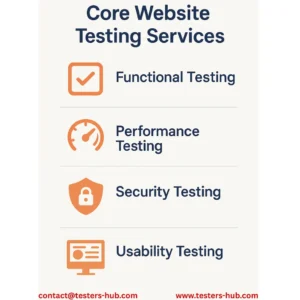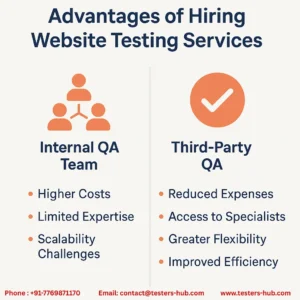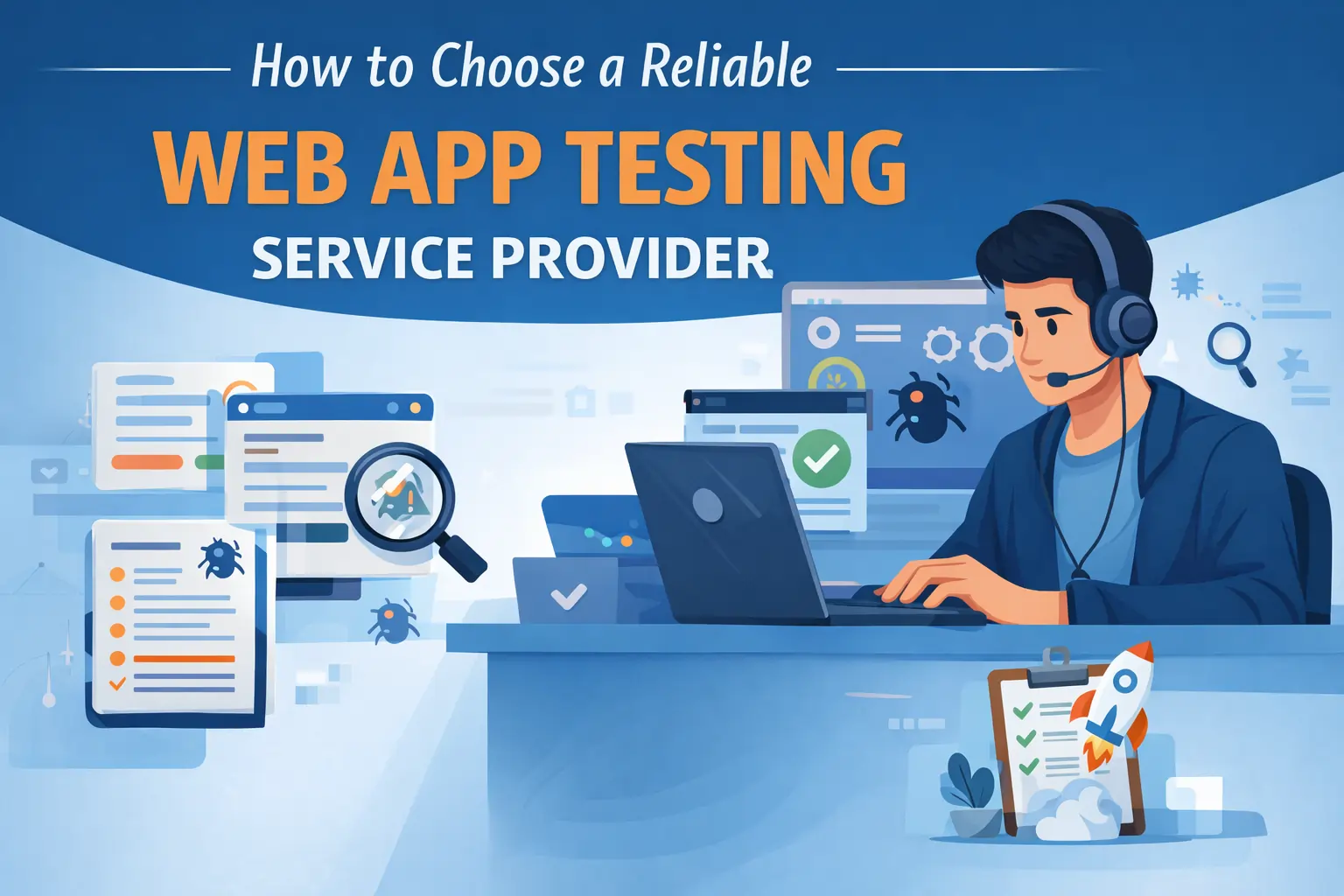Why Web Development Agencies Should Partner with a Website Testing Company
Introduction
Building and launching a website is only part of the journey for web development and digital agencies. Clients expect more than attractive designs; they demand flawless performance, fast speed, and reliability across every browser and device. Unfortunately, even well-built websites can fail when issues like broken forms, slow load times, or display errors are overlooked. This is where a website testing service becomes essential. By working with a dedicated web testing company, agencies can ensure that every project they deliver meets client expectations and performs consistently in real-world scenarios. Unlike relying only on internal reviews, partnering with professional testers provides broader coverage, unbiased results, and fewer surprises after launch. For agencies competing in today’s digital market, independent QA is no longer optional. It has become the difference between keeping clients satisfied and facing repeated escalations. Collaborating with specialized website testing companies helps agencies reduce rework, speed up delivery, and safeguard their reputation.
Want to strengthen your delivery process?
What Is Web Application Testing and Why Does It Matter
Agencies often hear the term “web application testing” but may not always distinguish it from regular website checks. The difference, however, is important.
- A website testing service verifies that pages load correctly, links work as intended, and the design adapts to different devices.
- A web application testing service goes further, focusing on interactive features like user logins, dashboards, shopping carts, content management tools, and integrations with third-party platforms.
In other words, software testing for web applications ensures not just how a site looks, but how it functions when real users interact with it. For an agency delivering e-commerce stores, SaaS platforms, or booking portals, this level of testing is vital. Skipping structured QA at this stage often leads to broken workflows, security risks, and frustrated end users. By partnering with a skilled web application testing company, agencies gain peace of mind that both the design and the underlying functionality meet professional standards before launch.
Need deeper coverage than a simple website check?
The Common QA Gaps in Agency Workflows
Even the most experienced web development teams face challenges when it comes to quality assurance. For agencies, the problem often lies in how testing is approached rather than in technical skills. Some of the most common gaps include:
- Tight timelines: Projects are usually scheduled around client deadlines, leaving limited time for detailed QA. Testing becomes a last-minute activity instead of an integrated step.
- Developers testing their own code: While efficient in theory, this approach introduces bias. A developer who built a feature may unintentionally overlook defects because they already “know how it should work.”
- Limited device and browser coverage: Agencies often check only on a desktop Chrome browser. Yet clients’ customers may use Safari on iPhones, Firefox on Android, or even older operating systems. Issues remain hidden until after launch.
- Budget constraints: Hiring and maintaining a dedicated in-house QA team can be expensive, so many agencies skip structured testing or assign it to junior staff.
These gaps lead to problems surfacing when websites go live precisely when agencies want to showcase their best work. Partnering with a professional web testing company helps fill these blind spots by providing wider coverage, dedicated testers, and unbiased reporting.
Core Website Testing Services Agencies Should Use
Every project an agency delivers comes with different expectations, yet the testing essentials remain the same. When a client invests in a new website, they aren’t just buying design; they are buying reliability. This is where a specialised website testing service supports agencies by covering areas that often slip through internal reviews. Take functional testing, for example. It’s not enough for a button to exist on a page; it must actually take the user to the right place, submit data correctly, and handle errors gracefully. Then there’s responsive testing, which ensures that the site looks and behaves as intended, whether someone is browsing on a high-end iPhone, a mid-range Android, or a desktop monitor. Agencies also benefit from cross-browser coverage, because clients’ customers don’t all use Chrome. Some may stick to Safari, others prefer Firefox, and ignoring those users means risking lost revenue. Beyond appearance, performance testing helps agencies prove that the site can cope with spikes in traffic during campaigns or seasonal sales. Equally important are usability checks, walking through the site like a real visitor to identify confusing paths or abandoned flows and accessibility reviews that confirm the website can be used by people with disabilities. Finally, security validation gives peace of mind that logins, forms, and payment gateways are protected. When these areas are tested thoroughly by a professional web application testing company, agencies hand over a site that not only looks impressive but also earns client trust from day one.
Want to deliver websites that work flawlessly from launch?
How Web Testing Companies Fit into Agency Workflows
One of the biggest concerns agency owners have about outsourcing is whether external testers will slow things down. In practice, a good web testing company does the opposite—they slot neatly into your delivery process and make life easier for both project managers and developers. Here’s how the collaboration usually works:
- Kickoff and requirement alignment – Testers review project goals, core features, and client expectations so they know exactly what success looks like.
- Coverage planning – A device and browser matrix is agreed on, based on the client’s target audience. This avoids unnecessary testing while still covering critical platforms.
- Execution phase – Dedicated QA specialists run structured checks, combining manual testing with selected automation tools. Instead of rushing at the end, this happens in parallel with development.
- Defect reporting – Issues are logged with clear steps, screenshots, or short videos. This helps developers reproduce and fix problems quickly rather than wasting time guessing.
- Validation and regression – Once fixes are applied, testers recheck the functionality and confirm nothing else was broken in the process.
- Final QA report – Agencies receive a clean, client-ready summary that highlights the work done and gives confidence before handover.
For projects involving integrations or APIs, testers can also demonstrate how to test web services manually—for example, by sending requests, validating responses, and checking for proper error handling. This is especially valuable for SaaS or e-commerce projects where multiple systems interact. Instead of being an outsider, the testing team becomes an extension of the agency, freeing developers to focus on building while ensuring no detail is missed.
Looking for a reliable web testing company to integrate into your workflow?
Stats That Highlight the Value of Third-Party QA
Data around user behavior shows just how unforgiving the online world can be. If a website fails to deliver smoothly the first time, most people won’t give it a second chance. For agencies, this means one missed bug can erase months of hard work convincing a client to invest in a new site. Performance is especially critical on mobile. Visitors expect pages to load almost instantly, and if they don’t, they leave. The result isn’t just a lost visitor—it’s a lost sale for the agency’s client and a blow to the agency’s credibility. There’s also the internal pressure agencies face. Development teams often acknowledge that defects slip through because testing is rushed near deadlines. Without dedicated QA, those issues resurface in front of the client, creating awkward explanations and urgent fire-fighting. Agencies that involve independent website testing companies early in their projects report a very different outcome. They deliver on time more often, reduce the number of bug-related escalations, and save hours of costly rework. In the long run, outsourcing QA usually costs less than repairing the damage of a flawed launch.
Want to give your clients a smooth, issue-free launch every time?
In-House QA vs Third-Party QA for Agencies
Agencies often wrestle with the decision of whether to keep quality checks in-house or bring in an independent web testing company. Both options have advantages, but when deadlines are tight and client expectations are high, the differences become clear.
- Cost efficiency: Maintaining an internal QA team means ongoing salaries, training, and investment in testing tools. Outsourcing allows agencies to scale QA on demand—paying only for what they need.
- Breadth of coverage: Most agencies can only test on a limited set of devices and browsers. Professional testers maintain access to wide device labs and cloud platforms, ensuring issues are caught before clients see them.
- Perspective: Developers checking their own work can unintentionally overlook problems because they already know how the system “should” behave. Independent testers bring fresh eyes and spot issues faster.
- Scalability: Agencies may manage a few projects at once, but when multiple client launches overlap, QA becomes a bottleneck. Partnering with an external team makes scaling simple.
- Speed of delivery: With dedicated testers focusing on validation, developers are freed to code, and project timelines move forward without last-minute crunches.
The takeaway? Agencies that rely solely on internal QA often face higher costs and slower delivery. Those that partner with experienced website testing companies typically enjoy smoother launches, happier clients, and stronger reputations.
Struggling to balance development and QA in-house?
Benefits for Agencies That Outsource QA
Agencies that choose to work with a dedicated website testing service quickly see the difference it makes in their workflow and client relationships. The value isn’t just in catching bugs—it’s in how outsourcing reshapes the way projects are delivered.
- More focus for developers: When QA is handled externally, agency developers can dedicate their time to building features instead of double-checking their own work. This leads to cleaner code and faster progress.
- Lower rework costs: Finding a defect before launch is far cheaper than fixing it after a client has gone live. Independent testers help agencies avoid expensive, reputation-damaging post-delivery patches.
- Client satisfaction: Delivering a polished website that works across devices and browsers creates lasting trust. Clients notice the difference and are more likely to return for future projects.
- Scalability without stress: Agencies don’t need to worry about hiring or training extra testers when multiple projects overlap. A professional web application testing company can scale support up or down depending on demand.
- Specialized expertise: Testers who focus solely on QA bring sharper skills and broader experience, particularly in areas like performance, accessibility, and software testing for web applications.
Ultimately, outsourcing QA transforms testing from a last-minute checklist into a value-adding step that enhances an agency’s reputation.
Real-World Agency Example
One of our partner agencies, a mid-sized digital studio delivering Shopify and WordPress sites, faced a recurring challenge. Their developers were talented and their designs impressed clients, but shortly after launches, complaints started to surface. Buttons didn’t align properly on iPhones, checkout steps broke on certain Android models, and Safari users encountered layout glitches. The agency’s internal testing focused mainly on desktop Chrome, which left major gaps. This not only frustrated clients but also forced the agency to spend extra time fixing issues post-delivery—often under pressure and without additional billing. By bringing in an external web application testing service, the agency changed its workflow. Independent testers ran structured checks across dozens of devices and browsers, logged issues with clear steps, and worked alongside developers to validate fixes. Within three months:
- Client-reported bugs dropped by nearly three-quarters.
- Delivery timelines improved because developers no longer juggled coding and testing.
- The agency won two larger contracts, highlighting independent QA as part of their offering.
This experience showed them that QA wasn’t just about reducing problems—it became a selling point that set them apart from competing web testing companies.
Want to turn testing into a competitive advantage for your agency?
Future Trends in Web Application Testing
Agencies that want to stay competitive can’t think of testing as a final checkbox—it’s becoming an integral part of every project. The landscape is shifting, and a few clear directions are emerging that will reshape how agencies deliver quality. First, automation tools are advancing. While they can’t replace human judgment, they’re helping testers cover repetitive tasks quickly, leaving more time for exploratory testing and usability checks. This means agencies that pair automation with expert manual validation will be able to deliver faster without cutting corners. Second, performance and security have moved to the front of client conversations. A website that loads slowly or exposes data risks isn’t just a technical issue—it’s a brand risk for the agency that built it. As a result, more agencies are treating performance testing and vulnerability checks as a standard part of delivery, not optional extras. Another shift is happening with accessibility. Businesses are increasingly aware that a site should work for everyone, including people using assistive technologies. Agencies that offer accessibility reviews through a web application testing company gain a competitive edge by showing inclusivity. Finally, agencies are beginning to treat QA partners as part of their team rather than outsiders. Instead of waiting until launch week, they’re involving testers earlier in the cycle. This collaboration reduces stress, avoids rushed fixes, and improves the overall quality of the project.
Want to keep your agency ahead of these shifts?
Why Agencies Choose Testers HUB
Agencies often tell us that what they value most is reliability. They need a partner who understands deadlines, communicates clearly, and delivers results that clients can see. That’s where Testers HUB stands out as a trusted website testing company for digital and web development agencies worldwide. Here’s why agencies choose us:
- Experience that matters: With years of expertise in web application testing services, we know the unique challenges agencies face when balancing creativity, development, and quality assurance.
- Real device coverage: Our team tests across a wide range of devices and browsers, ensuring your projects work flawlessly no matter how clients’ customers access them.
- Scalable support: Whether you need a single tester for a short project or a full QA team for multiple launches, we adapt to your workload without slowing you down.
- Clear, client-ready reporting: Every defect we log includes easy-to-follow details, screenshots, or videos—reports you can share directly with clients to show the thoroughness of your process.
- Flexible engagement models: From per-project support to ongoing monthly QA partnerships, we tailor our approach to fit the way your agency works.
By choosing Testers HUB, agencies gain more than a vendor. They gain a partner committed to helping them deliver websites and applications that build client trust and strengthen long-term relationships.
Looking for a web testing company that feels like part of your team?
Frequently Asked Questions (FAQ)
Q1. What is web app testing, and how is it different from website testing?
Web app testing looks at the interactive side of a project—logins, dashboards, forms, and integrations—while a basic website testing service focuses more on layouts, links, and responsiveness. Agencies working on e-commerce or SaaS projects usually need both.
Q2. How do you test web services manually?
Manual testing involves sending requests to an API or service endpoint, checking the response, and making sure the system handles both valid and invalid inputs correctly. This ensures that features relying on third-party integrations or data exchange don’t fail once the site goes live.
Q3. Why should an agency use a web testing company instead of relying only on in-house reviews?
In-house teams are valuable, but they often face time and resource limits. A professional web application testing company brings unbiased testers, broader device coverage, and structured processes that reduce the risk of client-visible bugs.
Q4. How does software testing for web applications benefit clients directly?
It ensures that interactive features—like booking systems, checkout processes, or content uploads—work seamlessly for every user. For agencies, this means fewer client complaints, faster project sign-offs, and stronger trust.
Q5. Which website testing companies are best suited for digital agencies?
The best partners are those who combine manual and automated testing, provide real device coverage, and adapt to agency workflows. At Testers HUB, we’ve designed our web application testing services specifically to support agencies handling multiple projects and tight delivery schedules.
Have more questions about QA for your agency?
Conclusion
For web development and digital agencies, delivering a visually stunning website is no longer enough. Clients expect projects that load quickly, work across devices, and support every feature without glitches. When those expectations aren’t met, the agency—not just the technology—takes the blame. That’s why relying only on internal reviews is risky. By partnering with a dedicated website testing company, agencies add a layer of assurance that strengthens their reputation and builds client trust. Independent QA catches issues before they reach the client, shortens delivery cycles, and saves costs by reducing post-launch fixes. Agencies that embrace structured web application testing services position themselves as premium providers. Instead of firefighting after launch, they deliver polished projects the first time, every time. Ready to make QA your agency’s competitive advantage? Schedule a consultation with Testers HUB and discover how our website testing services can help you deliver flawless projects that clients love.












